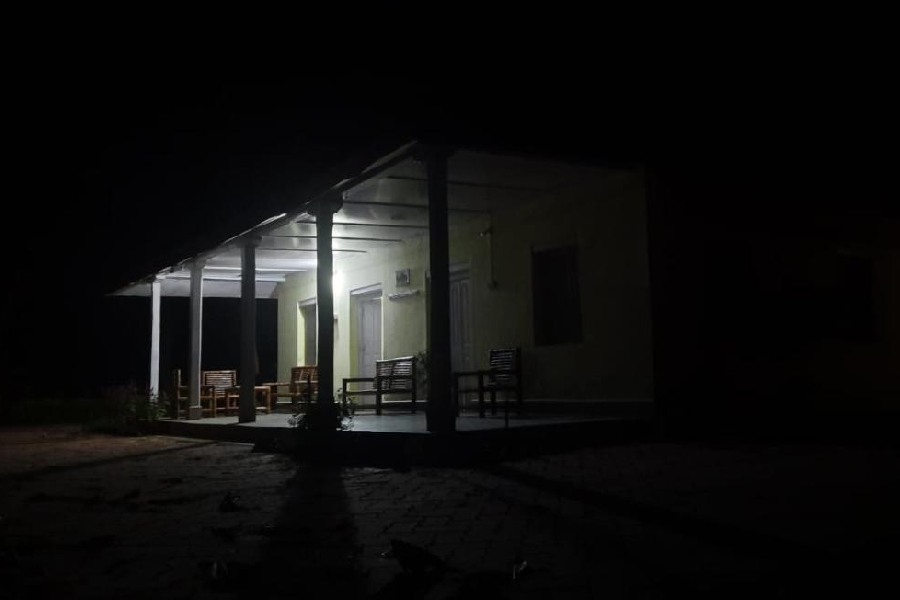On Diwali, guests at the Maromar Forest Rest House, nestled within the Palamau Tiger Reserve in Jharkhand, were greeted by an unexpected challenge — the need to bring their own diesel to light their rooms.
The popular accommodation, which has long been a favourite for tourists visiting the reserve, was shrouded in darkness because of a combination of malfunctioning solar panels and unreliable power supply, forcing visitors to contend with a series of discomforts at a facility suffering from longstanding neglect.
The solar panels installed at the rest house, about 200km from Ranchi, to provide electricity have been non-functional for nearly two years. Although the property has a generator, it remains underused due to the lack of a consistent fuel supply.
Guests, like Madhumita Chaudhuri, were forced to pay ₹500 for a small amount of diesel to run the generator and light their rooms for a mere five hours on Diwali night. In the absence of regular electricity, visitors are left to either siphon diesel from their vehicles or make a 20-km trek to the nearest petrol pump in Mahuataanr.
“In such a remote forest, we could have managed without electricity. Despite having all the necessary arrangements — which is otherwise commendable — they remain non-functional in a government property,” said Chaudhuri.
Caretakers point to frequent outages, often blamed on storms, cyclones, and other natural causes. But the larger issue lies in the persistent malfunction of the solar panels, which have remained inoperative for over two years, leaving the property without reliable lighting. Mahinder Singh, one of the caretakers, stated bluntly: “The solar panels have been lying defunct for almost two years.”
The Maromar Forest Rest House, built in the late 19th century by the British, once served as a retreat for colonial officers and was part of the British forest management system in Bengal. The building’s unique architecture blends colonial and local styles, offering a glimpse into the history of forest conservation.
Over the years, it has gained cultural significance, inspiring literary works by Bengali authors like Sanjibchandra Chattopadhyay, who penned Palamau, and Sunil Gangopadhyay, who set his novel Aranyer Dinratri in this region, which was later adapted into a renowned film by Satyajit Ray.
The rest house also holds personal significance for famed author Buddhadeb Guha, whose writings about the forest and its wildlife are cherished by readers. Guha even gave the place the name "Kusmi," and his photograph hangs prominently at the entrance. Thus, this forest and its properties remain celebrated among the Bengalis for their historical and cultural resonance in storytelling.
However, today, this historic property is in visible decline.
The facilities at the rest house are deteriorating. A government-installed water purifier, proudly branded with the photo of Jharkhand chief minister Hemant Soren, has been out of order since August. The washroom window in the main heritage cottage is missing its cover, exposing guests to privacy concerns.
Rules meant to preserve the tranquillity of the forest are often ignored. Recently, a group of travellers from Varanasi converted the rest house into a makeshift concert venue, blaring loud music from amplifiers and microphones until midnight.
Despite repeated requests from the caretakers to respect the peaceful environment of the reserve, the group refused to cooperate. “We’re just labourers,” said Babulal Singh, the caretaker’s assistant. “Even when we tell them not to disturb the forest’s peace, they ignore us.”
The nearby forest beat officer’s quarters remain mostly unoccupied, leaving the local caretakers with little authority to enforce regulations.
"You cannot play amplifier, that too at night, in such an interior area. It's infested with wild animals, who might feel disturbed. I shall definitely inquire into it," said Ashutosh Kumar, the director of the Palamau Tiger Reserve.
On the electricity issue, Kumar said: "Had there been continuous electricity throughout the day, the inverter could have functioned properly at night. However, power line tripping is a common occurrence in such interiors, which compounds the problem. We will look into this matter, as we agree that amenities meant for guests should be available for their use without any inconvenience."










